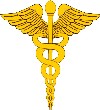Sick Call.
 Fort Dix, January 1969 – It started with a scratchy throat, and within 36 hours, I was having difficult time breathing; I could barely stand for more than 10 minutes, and I had a fever and chills. It was time to throw caution to the wind and go on sick call.
Fort Dix, January 1969 – It started with a scratchy throat, and within 36 hours, I was having difficult time breathing; I could barely stand for more than 10 minutes, and I had a fever and chills. It was time to throw caution to the wind and go on sick call.
Every morning (and I mean pre-sunrise) at formation, the First Sgt. would announce “SICK CALL.†If you wished to see a medic or a doctor, you were to fall out to be taken to a special barracks that was set up to screen those who reported for sick call.
The Army had a tiered system for seeing that only sick people went on sick call. It started with the First Sergeant. After announcing sick call, he always made it very clear that feigning illness to avoid training would not be tolerated. “You report for sick call, you better gott-damn well be sick. Don’t LET me hear from the medic that there’s nothing wrong with you. I hear that shit and I guaran-gott-damn-tee you that when I’m done with you, you WILL need a doctor.â€
So, if you felt sick enough to risk being accused of malingering and suffering the wrath of the Sergeant, you were taken to the next stage, where you got an opportunity to see a medic (an enlisted specialist – not a doctor), who would take your temperature and note your symptoms. For most of the guys, sick call ended there. The medic would dispense aspirins (“a couple whitesâ€) and send you back to duty. If, on the other hand, the medic determined that you really might be sick, you would get to see a doctor.
Because my eyes were glassy, my breathing sounded like Darth Vader’s, and I had a 101 temperature, I got to see a doc. After the doctor examined me and pronounced me sick, I was taken to Walson Army Hospital, where I was to become a patient in the URI (upper respiratory infection) Ward.
By the time I finally got to the ward, I could barely stand up. The medic in charge of the ward ordered me to get into bed and not to get out except to use the latrine (bathroom). I could have hugged him. I thought, a real bed – not a bunk, real sheets, a nightstand, and even cotton pajamas? Hell, maybe I wasn’t sick, after all. Maybe I died and this was heaven.
My euphoria (no doubt partially fever-induced) was short-lived, because I soon learned that, in the Army, you even had to be sick by the numbers. The Army knew how to get you better in days, because, after all, patient compliance is not an issue. It went something like this:
“You WILL stay in bed, unless you have to use the latrine.â€
“You WILL gargle with warm salt water every three hours for five minutes.â€
“You WILL have your temperature taken every hour.â€
“You WILL drink a quart of fluid [which tasted like vitamin fortified Kool-Aid] every two hours.”
“If your temperature rises to 101, you WILL be given an aspirin, and you WILL drink an quart of fluid, while the medic watches.â€
“If your temperature rises to 102, you WILL be given two aspirins, and you WILL drink another quart of fluid, while the medic watches.â€
“If your temperature rises to 103, you WILL be ‘packed’ in ice.â€
I believe that I must have slept for almost 18 hours (except for the temperature, fluid drinking, and peeing interruptions).
Then my temperature hit 102. I thought, Oh Christ, one degree away from the ICE.
I was uncontrollably shivering from the fever. I don’t believe I ever felt so cold. The poor guy’s temperature in the next bed hit 103, and, as promised, the medics put ice packs under his neck, under his arms, on his abdomen and on his groin (my God!). I recall, at that moment, thinking, J-J-J-Jeeesus. If my temperature goes up to 103, I hope it immediately shoots right through 103 and soars to 105 and I friggin’ die. Dying has to be easier than having ice put all over you while you’re this cold.
Mercifully, I never hit the magic number. Maybe that’s because I drank (and peed) the gallons of mandatory mystery fluids, and gargled my ass off. When I wasn’t peeing or gargling, I stayed in bed. I would have done anything to avoid the ice.
The Army also capitalized on the importance of motivating you to want to recover quickly. This was done by telling you that if you were in the hospital longer than a certain time (I think a week), you would be RECYCLED. “Recycled†meant that you might well start basic training all over again, with a new unit. Believe me, the prospect of starting all over again was one helluva motivator.
So, in about four days, the Army’s cure by the numbers worked its magic. Once again, I found myself back in the ranks, humping a pack and rifle the 12 miles to the rifle range in single digit temperatures and then lying on the frozen ground while the march-induced sweat froze.
It was still better than being recycled.




